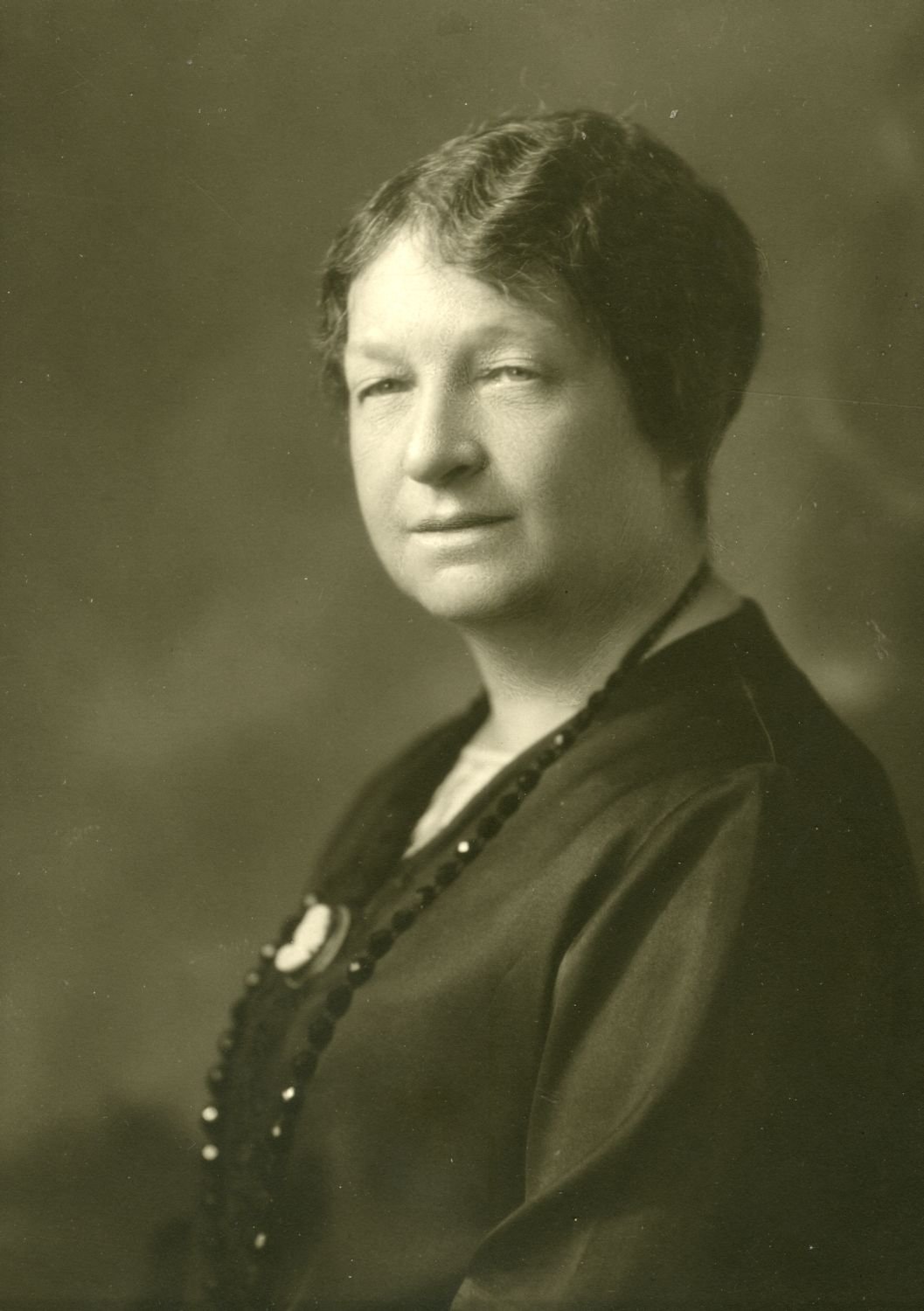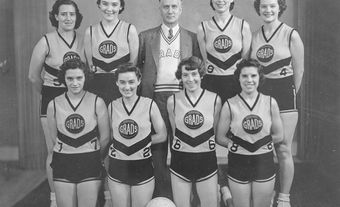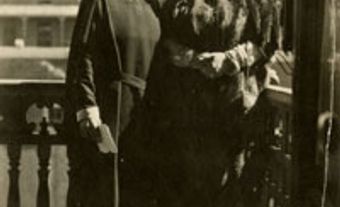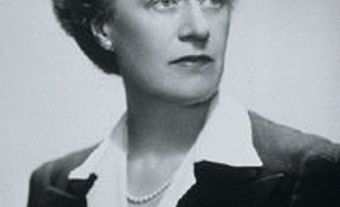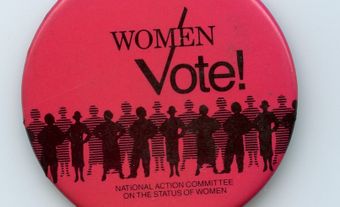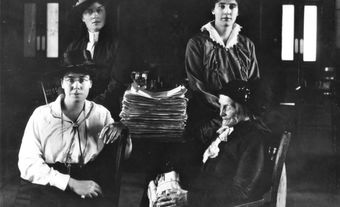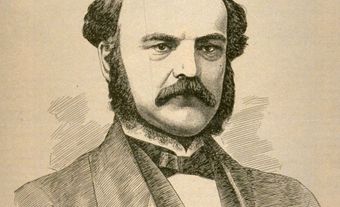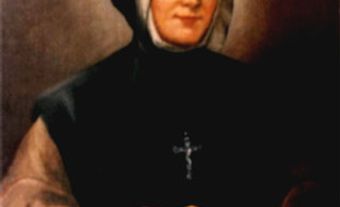Marie Gérin-Lajoie (née Lacoste) author, educator, social activist, founder of the Fédération nationale Saint-Jean-Baptiste (born 19 October 1867 in Montréal, QC; died 1 November 1945 in Montréal). From her family base in Montréal’s Catholic francophone elite, Gérin-Lajoie advocated for improvements in women’s status, including the right to vote. (See also Catholicism in Canada.) Through her writings and public lectures, she tried to ensure that all Quebec women would understand their rights and duties as defined in what she called the droit usuel: the law of daily life.
Early Life, Education and Marriage
Marie Lacoste and her nine siblings grew up surrounded by the comfort and privilege available to the children of successful lawyer, law professor, politician and jurist, Alexandre Lacoste, who was made a Knight Commander of the Most Distinguished Order of Saint Michael and Saint George (KCMG) in 1892. When Marie Lacoste graduated at 15 from the Couvent d’Hochelaga, none of Québec’s Catholic francophone universities accepted female students, so she embarked on a project of self-education, taking full advantage of her father’s extensive library (see History of Education).
In 1887, she married Henri Gérin-Lajoie, then a young associate in her father’s law office. Her father-in-law, Antoine Gérin-Lajoie, author of the famous song "Un Canadien errant" and the novel Jean Rivard, le défricheur, wrote legal texts for a popular audience. Henri Gérin-Lajoie was a legal writer as well as a practising lawyer, with a large library to support his wife’s interests in educating herself and others about the law.
Career Highlights
For Marie Gérin-Lajoie, the home that she made with Henri Gérin-Lajoie was the setting for raising their four children and for nourishing her, and her children’s, commitment to action sociale – serving God through promoting justice, with a special focus on women. Marie Gérin-Lajoie’s approach to social justice thus shared much with the maternal feminist and social gospel thinking of Anglo Canadians (see Women’s Movement). Her métier, though, was Quebec, with its distinctive family law, which regarded the family unit as a community headed by the husband, who had the responsibility to make decisions for the good of the whole community, and to manage the family property to that end. Gérin-Lajoie did not contest the hierarchy inherent in this view, but she did not accept it uncritically. When Quebec created the Commission des droits civils de la femme, chaired by C.-E. Dorion (1929), she advocated successfully for an amendment to Québec’s Civil Code, adopted in 1931, to give wage-earning women legal control over their pay (see Women and the Law).
Marie Gérin-Lajoie made it her mission to ensure that young women learned of the legal regime that would govern their lives as wives, mothers and wage earners. She failed in her campaign to persuade the educational authorities to include instruction about law in the mandatory school curriculum, but many teachers and their students learned about the law from Marie Gérin-Lajoie’s Traité de droit usuel, first published in 1902, and published in English the same year with the title A Treatise on Everyday Law. Marie Gérin-Lajoie brought out three new editions over the next three decades, and distributed the book widely to schools, political leaders and women’s groups. She also gave public lectures explaining law for a popular audience, as well as lecturing on the subject in schools, teacher training colleges and universities.
Believing in the importance of education for girls and a strong supporter of women's access to higher education, in 1908 Marie Gérin-Lajoie was involved in the founding of l’École d’enseignement supérieur. This first collège classique (classical college) for girls was under the direction of the sisters of the Congrégation de Notre-Dame de Montréal and affiliated with Université Laval in Montreal (which became Université de Montréal). In 1911, her daughter, Marie-Joséphine, graduated from the school, making her the first French Canadian woman to earn a Bachelor of Arts degree in Quebec.
Fédération nationale Saint-Jean-Baptiste
In 1907, Marie Gérin-Lajoie, with Caroline Dessaulles-Béique, established the Fédération nationale Saint-Jean-Baptiste, an umbrella organization for francophone Catholic women’s charitable and professional associations under the motto Vers la justice par la charité (Towards Justice Through Charity). Marie Gérin-Lajoie led the organization for next 20 years. She used its monthly publication, La bonne parole, to educate women about their rights and duties, and to advocate for law reforms to benefit women, including admitting women to the practice of law, improving employment conditions for domestic workers, and granting married women more power in family decision-making and greater protection when their husbands died without leaving a will.
Marie Gérin-Lajoie and the Fedération were early advocates of the right of women to vote in provincial elections. In 1921, Gérin-Lajoie joined with Anna Marks Lyman, the president of the Montréal chapter of the National Council of Women of Canada, to create the Provincial Franchise Committee (see Women’s Suffrage). The Committee led a large delegation to Québec City the following year to support a bill giving women the vote. The bill did not get past first reading, and Gérin-Lajoie subsequently gave up her position as head of the francophone section of the Provincial Franchise Committee in order to protect the Fédération from being denounced by those in the Catholic hierarchy who opposed votes for women.
Legacy
When Marie Gérin Lajoie’s husband, Henri was killed in an accident in 1936, she retreated to the Institut de Notre-Dame-du-Bon-Conseil, the motherhouse of a religious community founded in the previous decade by her eldest daughter, Sister Marie-Josephine Gérin-Lajoie. She remained at the motherhouse until her death.
Marie Gérin-Lajoie, celebrated today as an early feminist, used the law and legal education for women to promote values of justice, charity and duty, which she saw as necessary for the maintenance of Quebec’s basic institution, the family. Her social activism derived from her perception that women should have the necessary education and authority to effectively fulfill their roles as wives, mothers and guardians of morality within the family and society at large.
A performance and conference hall at the École supérieure de théâtre at the Université du Québec à Montréal (UQAM) is named in Marie Gérin-Lajoie’s honour, in recognition of her role in the struggle for equal rights for women in Quebec, particularly civil and political rights, and equal access to education, the professions and the workplace. In 2012, a statue — named Monument en hommage aux femmes en politique — was erected near the National Assembly of Québec to honour Marie Gérin-Lajoie as well as Idola Saint-Jean, Thérèse Casgrain and Claire Kirkland-Casgrain. In 2019, Marie Gérin-Lajoie was designated a historic figure by the Ministère de la Culture et des Communications du Québec.

 Share on Facebook
Share on Facebook Share on X
Share on X Share by Email
Share by Email Share on Google Classroom
Share on Google Classroom



